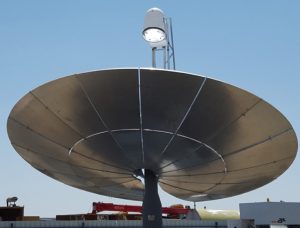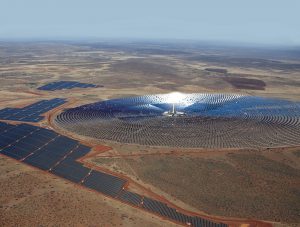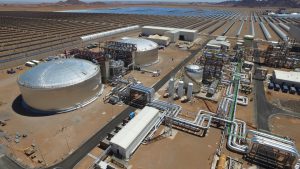Concentrated Solar Power (CSP) is a rapidly growing renewable energy technology that harnesses the sun’s heat to generate electricity. Unlike photovoltaic (PV) systems, which convert sunlight directly into electricity, CSP uses mirrors or lenses to concentrate sunlight onto a small area, typically a tower or a series of tubes containing a heat transfer fluid. This …
Solar Stirling Engines: A Novel Approach to Concentrated Solar Power
Solar Stirling engines represent a novel approach to concentrated solar power (CSP) technology, offering a potentially more efficient and cost-effective solution to harnessing the sun’s energy. As the global demand for clean, renewable energy sources continues to grow, the development and implementation of innovative solar technologies are becoming increasingly important. In this context, the Solar …
Continue reading “Solar Stirling Engines: A Novel Approach to Concentrated Solar Power”
Published at Solar Energy – Black coating of quartz sand towards low-cost solar-absorbing and thermal energy storage material for concentrating solar power
Published at Solar Energy – Black coating of quartz sand for low-cost solar-absorbing and thermal energy storage material for concentrating solar power Abstract: Solid particles-based direct solar absorbing heat transfer fluid (HTF) and thermal energy storage (TES) material is gaining increasing interest for high-temperature concentrating solar power (CSP). However, there is no particulate material that …
Solar fuels are made using thermochemistry driven by direct heat from the sun
Solar thermochemistry is a process in which solar thermal energy drives chemical reactions to produce new compounds. Highly concentrated solar heat is reflected off thousands of mirrors in a solar field surrounding a tower receiver to heat a solar reactor. These reactions can produce chemical compounds like ammonia or fuels like aviation fuel. National research …
Continue reading “Solar fuels are made using thermochemistry driven by direct heat from the sun”
Concentrated Solar Power with Integrated Thermal Storage
Concentrated solar power (CSP) has long been touted as a promising renewable energy source, with the potential to significantly reduce greenhouse gas emissions and our reliance on fossil fuels. One of the key advantages of CSP over other renewable energy sources, such as photovoltaics (PV), is its ability to store thermal energy for use when …
Continue reading “Concentrated Solar Power with Integrated Thermal Storage”
How solar fuels work: thermochemistry
Solar fuel researchers test the solar thermochemical reactor designed for Synhelion’s jet fuel production Solar fuels are made using thermochemistry driven by direct heat from the sun Solar thermochemistry is a process in which solar thermal energy drives chemical reactions to produce new compounds. Highly concentrated solar heat is reflected off thousands of mirrors in …
Integrated Solar Thermal Hybrid Power Plants: CSP and PV
Integrated Solar Thermal Hybrid Power Plants are emerging as a promising solution to address the growing global demand for clean and sustainable energy. These innovative power plants combine the strengths of both solar thermal and photovoltaic (PV) technologies, harnessing the sun’s energy to generate electricity in a more efficient and cost-effective manner. As the world …
Continue reading “Integrated Solar Thermal Hybrid Power Plants: CSP and PV”
Concentrated Solar Power with Thermal Energy Storage
Concentrated solar power (CSP) with thermal energy storage is an innovative and promising technology that has the potential to revolutionize the renewable energy sector. This technology harnesses the sun’s energy by using mirrors or lenses to concentrate sunlight onto a small area, where it is converted into heat. This heat is then stored in a …
Continue reading “Concentrated Solar Power with Thermal Energy Storage”
Exploring the Potential of Thermal Energy Storage for a Sustainable Future
As the world continues to grapple with the challenges of climate change and the urgent need to reduce greenhouse gas emissions, the search for sustainable and efficient energy storage solutions has become a top priority. One promising technology that has garnered significant attention in recent years is thermal energy storage (TES). This innovative approach to …
Continue reading “Exploring the Potential of Thermal Energy Storage for a Sustainable Future”
Published at Solar Energy – Simplified analytical model to describe wind loads and wind-induced tracking deviations of heliostats
Simplified analytical model to describe wind loads and wind-induced tracking deviations of heliostats Abstract: Wind-induced tracking deviations of heliostats can be analyzed through numerical simulations or experimental studies on a full-scale heliostat. However, these methods are relatively costly and often, simpler estimations are necessary and sufficient. One simpler approach is to use an analytical model that describes …










